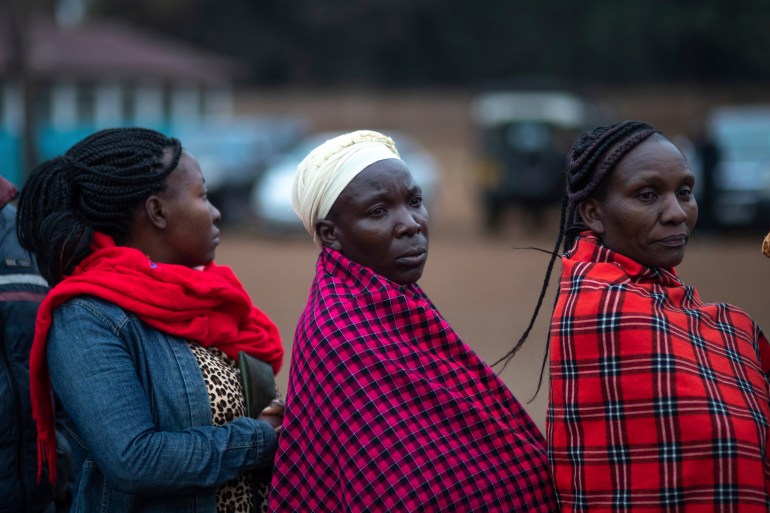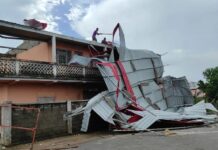- Kenyans are heading to the polls on Tuesday to select the successor to President Uhuru Kenyatta.
- Cost of living, high unemployment and rampant corruption have dominated the campaign season, with top presidential candidates Raila Odinga and William Ruto pledging to address the country’s gaping inequality and focusing largely on domestic issues.
- The presidential race could be the first in the country’s history to go to a runoff, with polls showing Odinga, a one-time rival of Kenyatta who has since allied with him, and Ruto, the current deputy president who has fallen out with Kenyatta, running neck and neck.
- Overall, more than 16,000 candidates are vying for 1,879 elected positions, including members of the Senate, the National Assembly, the County Assembly and governors.
- Official results in the country of 53 million, with more than 22 million registered voters, will be announced within a week. Presidential candidates need more than half of all votes, as well as more than 25 percent of votes in over half of the country’s 47 counties, to avoid a runoff.
-
Kenyan diaspora voting in 12 countries
Kenyans living abroad in 12 countries are voting, according to the election commission.
-
(12:11 GMT)
‘There is so much poverty’: Kenyan voter
Nairobi, Kenya – Casting his vote in the Kilimani neighbourhood, Eric Moracha, 47, said he has voted for Odinga all five times he has run for president.
The computer studies teacher at a local college said he “feels a connection” to the longtime opposition figure, and that he particularly like’s Odinga’s plan to give $50 (6000 KSh) per month to two million poor and vulnerable households.
“There is so much poverty in this country, our youths are turning to crime,” he told Al Jazeera.
-
(11:23 GMT)
Candidate’s lawyer alleges issues with electronic ID system
Nairobi, Kenya – A lawyer for Odinga’s One Kenya Coalition has sent a letter to the chairman of the election commission, decrying what he described as the “large number” of failures of the electronic identification system (KIEMS) kits used at polling stations.
Paul Mwangi wrote that the Odinga campaign was “appalled” by the alleged failures of the kits.
“The campaign is also appalled that the vast majority of these failures are occurring in the strong holds of [Odinga],” he wrote.
The election commission has maintained the KIEMS system, which was at the centre of a challenge by Odinga following the eventually annulled presidential election in 2017, makes voting more secure.
The commission told Al Jazeera earlier in the day that minor issues had been reported at just 229 of the more than 46,000 polling stations in the country.
-
(11:19 GMT)
The bitter rivalry of presidential candidates Odinga and Ruto
-
Youth ‘feel their votes don’t count’: Voter
Nairobi, Kenya – Derrick Makolo, 25, a social worker, was voting in the Kilimani neighbourhood.
Regarding the somewhat low voter registration rates among the youth, he said: “A lot of them feel that their votes don’t count which I don’t agree with, but they feel they’ve been electing leaders and nothing has been changing for them.”
“So, a lot of them have that opinion, that why should they go out and vote and things will remain the same?”
“But personally I’m out here because your vote definitely counts, because if you don’t vote, someone else will vote and determine who will enter and they may not push views favourable to the youth.”
-
(10:39 GMT)
European Union election observers visit polling sites
Touring a voting centre in Nairobi, Ivan Stefanec, the head of the EU’s election observation mission, said more than 160 observers had been stationed across Kenya.
“We are more than 160 observers basically working in pairs spending roughly 30 minutes in polling stations observing identification of voters, secrecy of voting and all the procedures and we also follow counting of votes and also transmission of results,” he said.
“We do believe that democracy is really very key and it is important that it is working that is what is common for European Union and for Kenya.”

People line up to vote at the Kibera Primary School in Nairobi, Kenya [Mosa’ab Elshamy/The Associated Press] -
(10:33 GMT)
Voting going ‘fairly smoothly’ with turnout at about 30 percent
Reporting from Eldoret in Kenya’s southwest, Al Jazeera’s Haru Mutasa said no significant voting problems have been reported.
“There’s been a few technical and logistical issues at some polling stations in some parts of the country, but on the whole voting has been going fairly smoothly,” she said.
The election commission told Al Jazeera there have been issues reported at 229 polling stations out of over 46,000 but said the problems were not serious.
The commission said turnout was at about 30 percent, with 6.2 million Kenyans voting as of noon (10:00 GMT).

An aerial view shows people lined up to cast their votes during the general elections in Eldoret, Kenya [Baz Ratner/Reuters] -
(10:00 GMT)
Presidential candidate says waiting to vote after electronic ID system issue
The process of verifying voters at polling sites has been at the centre of debate during the election season, with an appeals court ruling that election officials can use the electric Kenya Integrated Election Management System (KIEMS) kits as the primary means of identifying registered voters.
The electronic kits – which also transmit vote tallies – were at the centre of controversy in the 2017 election, with proponents saying they protected against repeat voters. The election commission has said new updates to the kits will provide further protections.
Roots Party presidential candidate Professor George Wajackoyah told reporters the electronic kit failed to identify him and other voters in his stronghold of Matungu in Kakamega County. He said he had been told to wait while election officials sorted the issue.
Rigathi Gachagua, Ruto’s running mate, also reportedly experienced some issues with having his fingerprint read by the electronic identification system but was eventually able to vote and expressed confidence in the system.
-






